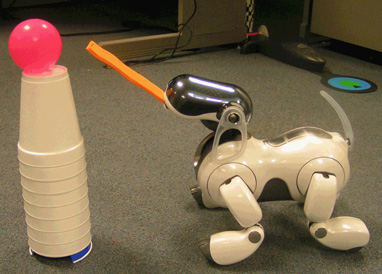International Workshop on
Natural and Artificial CognitionPembroke College, Oxford
June 25 and 26, 2007
Alex Kacelnik and Paul Cohen
April 20th, 2007
Thanks to the support of the US National Science Foundation and euCognition , the European Network for the Advancement of Artificial Cognitive Systems, we are able to invite an international and diverse group of experts in human, animal and machine behavior and cognition for a workshop at Pembroke College, Oxford . The primary objective of this workshop is to bring together two remote communities, in behavioral ecology and in artificial intelligence and cognitive science, to discuss common problems we face in defining and studying theoretically and empirically critical concepts in our field, including “understanding”, “problem solving”, “creativity” and so on. One focus will be tool use, but we shall not shy away from other topics, such as distributed versus centralised intelligence (as illustrated by social insect colonies) and basic processes of memory, reinforcement and learning. We hope to identify principles that apply universally to all agents, to humans and other animals and AI systems and robots, alike.
Ecology. The differences between the fields are in a sense methodological.
Behavioral ecologists study live, whole animals. They rely on careful experiments to induce what might be going on in animals’ minds and in their social interactions. Cognitive scientists, particularly those in AI, study algorithms primarily, occasionally embedding them in cognitive architectures, more rarely still embedding algorithms and architectures in rich, ongoing environments. If we view behavior as arising from interactions between an agent’s architecture

and tasks and its environment, then a scientific understanding of behavior requires models of these interactions. Research along these lines is extremely rare in AI, whereas it is the norm in behavioral ecology. Whereas Behavioral Ecology arguably holds the better hand when it comes to studying complete intelligences in their environments, AI excels in modeling technologies, specifically architectures, representations and reasoning methods, and algorithms for estimating model parameters from data. If we are to hope for models that describe both natural and artificial intelligences in their respective environments we will need the expertise of behavioral ecologists and AI researchers, both.
Bringing these two fields of study together raises some ancient philosophical problems, e.g. about relationships between concepts used to describe mental states and processes and concepts used to describe physical mechanisms, about the nature of explanatory theories in science and their relationship to evidence, about the concepts of information and representation and in the case of studies of tool use, the nature of space, time and causality.

Crow image: Copyright © Simon Walker
Aibo image: Copyright © Rob St. Amant
